The last Palestinians resisting in the olive groves: ‘The settlers are trying to take away the food we put on the table so they can then take our land’
West Bank farmers claim that they were already suffering attacks by settlers before October 7, but that now the Israeli army has also joined in the harassment
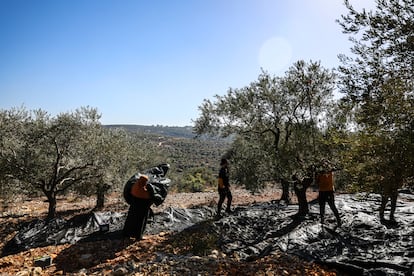

“I will die of a gunshot, but not of hunger,” Fayza says as she separates the olives from the leaves, sitting on the ground. The 62-year-old has been harvesting olives in the West Bank village of Salfit, the largest olive oil producing area in Palestine, since she was a child. Fayza and nine other members of her family are the only people from the surrounding area working in the olive groves at the height of harvesting season. It also appears that they will be the last. Since October 7, when Hamas launched an incursion into Israel, leaving 1,200 people dead, attacks on farmers have multiplied throughout the West Bank, preventing Palestinians from accessing their land and even being killed if they get too close to their fields.
In Salfit there have been no deaths, but there has been harassment and theft of produce. Jamal Mustafa Abu Salimé, owner of an olive grove, considers himself “lucky.” He can at least cultivate this field, one of the five he owns. He has already given up trying to work the others — some 200 hectares in Area C, controlled exclusively by Israel — scattered in the vicinity of the city, due to harassment by settlers from Rosh, a nearby Israeli settlement. At the end of October, he made one last attempt, arriving earlier than usual, at 4 a.m., to avoid confrontation. But it didn’t work. As soon as the 12 workers in his crew began unloading tools, a drone flew over them at close range. They fled.
“If you see the drone, keep your heads down,” he warns, pointing in the direction of the settlement. He also says that they are frequently targeted with laser lights, but that doesn’t worry him. The settlement is not visible from the olive grove, some 700 meters away. That is why they have been able to go to work for four days. Even so, on November 6, they brought in more machines to speed up the process. “It’s only a matter of time before they come after us too, so we have to work fast,” says one of the workers, Mohamed Saed Al Hasan. He says that when the attacks started in other fields the family got together and decided not to put themselves at risk by coming to collect the harvest, but after a few days his father changed his mind. “There are 12 of us in the family and we can’t give up the $2,000 we get from the oil,” he explains. The landowner does not pay them a salary, but shares a percentage of the profit, and for them it is their only income. “The settlers are trying to take away the food we put on the table so they can then take our land,” he says.
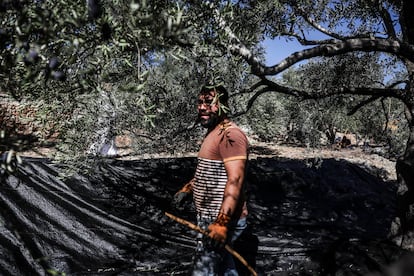
Fayza, however, refuses to work against the clock. “Of course I fear for my life, but I don’t plan to stay inside my house and close the door, which is what they are after. Every day when I come here and see that there has been another attack, I read verses from the Koran to protect us, because only Allah determines when it is time for us to die,” she says. The woman casts her eyes skyward, jaded, when asked what harassment she has been subjected to. The day before, she says, six Israeli army soldiers cut them off as they left the camp heading home. They interrogated and searched them. It is still fresh in her mind how in neighboring land, at a higher altitude than this, just 12 days ago, the army came in with bulldozers to raze the crops. Or how practically every night brigades of soldiers enter the town to carry out raids and arrests. At the entrance to the olive grove are the remains of a Bedouin village, home to 40 people who fled in mid-October after the army destroyed their homes.
All agree that the olive harvest in Salfit was proceeding relatively normally before October 7. “Since the Israelis started attacking us, the Palestinian National Authority has done nothing. We are alone in this,” says Salimé. In other areas of the West Bank, coexistence before the Hamas attack was rarely placid. In places like Qusra, southwest of Nablus, olive growers had to tell the Israeli army that they wanted to harvest their land and they would tell them when to do so: it was the soldiers who protected them from the settlers. But with the outbreak of the war, the army has not only stopped doing so but has joined in the attacks, according to the mayor, Mohamed Jabe. As a result, no one in Qusra has been able to harvest a single olive.
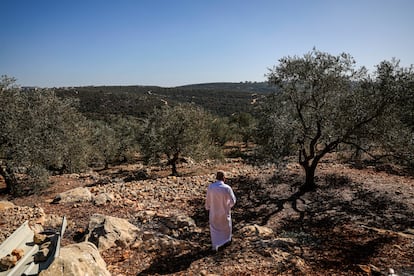
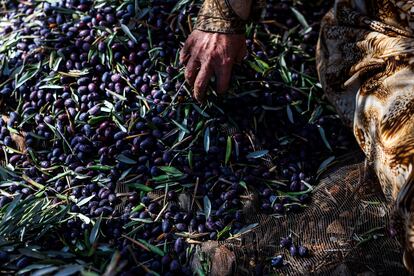
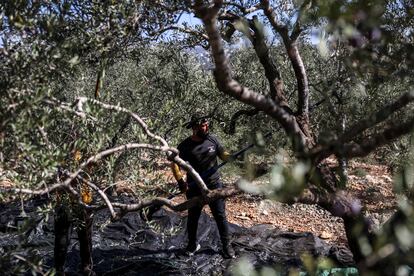
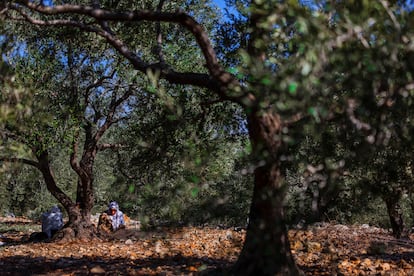
No difference between settlers and soldiers
That turning point has also been felt in Salfit. Fayza says they were accustomed to fearing the Rosh settlers, but now they are no longer even sure when the attacks come from them or from the army. “The ones in the settlement dress in military clothes; I try to tell them apart by the kippah,” she says. Salimé explains that the situation has worsened in the last two years, since the settlement was established. Rosh is small, belonging to a single family engaged in sheep farming. “It is not possible that a family of 10 or 15 members is responsible for us not being able to harvest hectares and hectares of olive trees. They are not [acting] alone,” he protests.
It is unusual to see a group of hurried workers thinning the olive trees with the deafening noise of the machines at midday. There has been an increase of cases like that of Basel Al Arid, a 52-year-old farmer who speaks to EL PAÍS at his home, as he has not been able to go near the two fields he owns for weeks. He already assumes, disconsolately, that he has lost the harvest. The last time he tried to work his groves was a week earlier, around 10 a.m., when he loaded his material into the van. “Then a neighbor from the next field called me and warned me that when he was harvesting, the settlers came and attacked him and his wife at gunpoint. They forced them to put all the equipment and fruit in the settler’s truck, so now they’ve lost that too,” he says. He decided not to risk it.
His land borders the territories illegally occupied by Rosh settlers, at a higher point than Salimé's more vulnerable fields. He is unable to calculate the economic impact this situation will have on his family and workers. It is his only source of income. “I have the permit to work in Israel, and I did that some time ago, but now I can’t even get through,” he explains. The Palestinians in Salfit cannot use the main road because it intersects with a bypass built for the Ariel settlement and the army prevents them from passing. Because of this, and the continuous border controls, the inhabitants of the area have been using secondary roads to reach the village for a month. But not their fields.
Sign up for our weekly newsletter to get more English-language news coverage from EL PAÍS USA Edition
Tu suscripción se está usando en otro dispositivo
¿Quieres añadir otro usuario a tu suscripción?
Si continúas leyendo en este dispositivo, no se podrá leer en el otro.
FlechaTu suscripción se está usando en otro dispositivo y solo puedes acceder a EL PAÍS desde un dispositivo a la vez.
Si quieres compartir tu cuenta, cambia tu suscripción a la modalidad Premium, así podrás añadir otro usuario. Cada uno accederá con su propia cuenta de email, lo que os permitirá personalizar vuestra experiencia en EL PAÍS.
¿Tienes una suscripción de empresa? Accede aquí para contratar más cuentas.
En el caso de no saber quién está usando tu cuenta, te recomendamos cambiar tu contraseña aquí.
Si decides continuar compartiendo tu cuenta, este mensaje se mostrará en tu dispositivo y en el de la otra persona que está usando tu cuenta de forma indefinida, afectando a tu experiencia de lectura. Puedes consultar aquí los términos y condiciones de la suscripción digital.








































